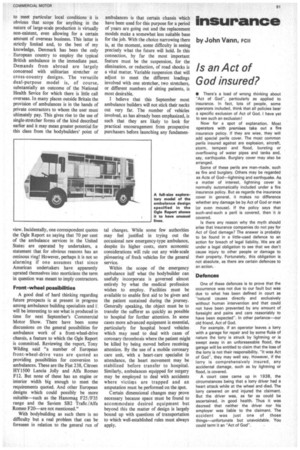insurance
Page 93

If you've noticed an error in this article please click here to report it so we can fix it.
by John Vann, FCII
Is an Act of God insured?
• There's a load of wrong thinking about "Act of God", particularly as applied to insurance. In fact, lots of people, some operators included, think that all policies bear a specific exclusion of Act of God. I have yet to see such an exclusion!
Now for a spot of explanation. Most operators with premises take out a fire insurance policy. If they are wise, they will add special perils cover, The most common perils insured against are explosion, aircraft, storm, tempest and flood, bursting or overflowing of water pipes and tanks and, say, earthquake. Burglary cover may also be arranged.
Some of these perils are man-made, such as fire and burglary. Others may be regarded as Acts of God—lightning and earthquake. As a matter of interest, lightning cover is normally automatically included under a fire insurance policy. But as regards the insurance cover in general, it makes no difference whether any damage be by Act of God or man (or even mouse). If the policy says that such-and-such a peril is covered, then it is covered.
Is there any reason why the myth should arise that insurance companies do not pay for Act of God damage? The answer is probably to be found in a little-used defence to an action for breach of legal liability. We are all under a legal obligation to see that we don't cause injury to other people or damage to their property. Fortunately, this obligation is not absolute, as there are certain defences to an action.
Defences
One of these defences is to prove that the occurrence was not due to our fault but was due to what has been defined in court as "natural causes directly and exclusively without human intervention and that could not have been prevented by any amount of foresight and pains and care reasonably to have been expected". In other parlance—our old friend, Act of God.
For example, if an operator leaves a lorry with a garage for repair and by some fluke of nature the lorry is struck by lightning or is swept away in an unforeseeable flood, the garage will be entitled to claim that the loss of the lorry is not their responsibility. "It was Act of God", they may well say. However, if the lorry is comprehensively insured, any accidental damage, such as by lightning or flood, is covered.
A court case came up in 1938, the circumstances being that a lorry driver had a heart attack while at the wheel and died. The lorry careered on and injured the claimant. But the driver was, as far as could be ascertained, in good health. Thus it was decreed that neither the driver nor his employer was liable to the claimant. The accident was just one of those things—unfortunate but unavoidable. You could term it an "Act of God".




























































































































































































